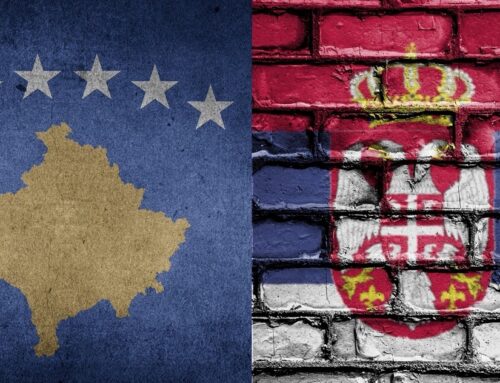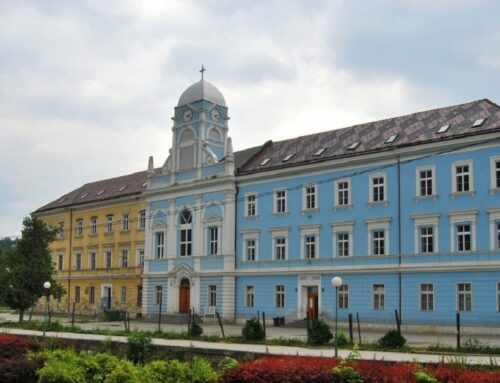Introduction
The history of the Balkan region is the product of conflictual nationalistic rhetorics, especially since the break-up of Yugoslavia (1991). The Balkan region, an ethnically diverse geographical area, rich with cultural and linguistic heritage, could not manage the plethora of ethnic conflicts, social racism and multiple institutional rejections over time. The question of nationalism is the inevitable point in each Balkan country. Moreover, the fact that even though people speak almost the same language, ethnic hatred still exists among the diverse communities of Slavic origin. This was, and still, is a quite shocking episode of Balkan national history. The “Megali” idea depicts the willingness of each Balkan country to be greater. It’s a historical dimension born after the collapse of the Ottoman Empire in the early 1920s. The Balkan countries depict the presence of the Ottoman Empire, which lasted for almost five centuries, as an occupation, however, none of the Balkan countries publicly admits that the Ottoman Empire preserved their cultural heritage, religion and local languages. From a historical point of view, the policies of the Ottoman Empire were more adequate for the development of the Balkan region than the current or the contemporary prevailing nationalistic thoughts, concepts and rules. In general, older people praise the heritage of the Ottoman past and the heroic deeds of Tito in the Yugoslavian era, while younger people prefer to leave abroad. The phenomenon of “brain drain” is unstoppable and is shaking the entire Balkan institutional structure.
The idea of the Greater one (the historical notion of ‘Megali’)
The author Hagen.W. William depicts the turbulent nature of the Balkan numerous forms of nationalism as “lethal”[1]. This is a metaphor describing the disastrous national politics of the Balkan region. Basically, each ethnic group wants to be the predominant one (the Greater one (inspired by the “Megali” idea)). Such politics provokes division, and division creates chaos. In a world of chaos, dialogue is the only legal mechanism that can possibly function. However, in the Balkan case, the ethnic dialogue lasts for many decades. North Macedonia and Greece needed almost 30 years to solve the historical question of the name ‘Macedonia’. The tensions between Kosovo and Serbia are recurrent, and the political dialogue is conducted since 2008. However, no progress has been made so far. Many countries in the world did not recognize Kosovo yet. As a matter of fact, the asylum seekers from Kosovo, are often repatriated or sent back to Serbia.
The individualized soul of the Balkan ethnic map
The formation of the Balkan nation-states started to take place slowly but steadily in the course of the 19th century. It looks like the frequent political quarrels about identity, the status of the minorities, the implementation of the theoretical aspect of law and the absence of cultural wisdom let the entire state apparatus float on the nationalistic sky. The Historian Benedict Anderson presents nations as a painting of “imagined communities”[2]. The spectrum of colours depicts the ethnic diversity present in each Balkan country or in any country of the world. The scholar Ernest Gellner clearly defines nationalism as the primary concept of social thought: “nationalism is not the awakening of nations to self-consciousness: it invents nations where they do not exist”[3]. This definition illustrates the perfect design or architecture of the Balkan ethnic map. Nations enact where they do not exist. Politicians mix the concepts of nationhood and ethnic group. Nationhood is a concept that represents the structure of the state. An ethnic group has a significant number of members or subjects. Politicians, long ago, started to individualize ethnic groups and consider them as separate nations. This idea is incredibly wrong because nations are fictive entities, but the people are real subjects. Therefore, ethnicity as a notion comprehends the existence of a particular group of people, but that does not always constitute a nation. In many countries, nowadays, various ethnic groups create the essence of the nation. Not always a singular ethnic group constitutes a nation. It is practically impossible, in this 21st century, to talk about only one ethnic group and one nation, because we live in a very globalized and multicultural world where migrations are a recurrent phenomenon, not a rare one.
The dark chapters of Balkan history
Some dark chapters of Balkan history are the deportation of the Macedonian Jews in 1943 in the concentration camp of Treblinka and the Genocide of Srebrenica in 1995 (Bosnia and Herzegovina). These unfortunate events modified completely the international image of the region. The political tensions between Kosovo and Serbia, Albania and Macedonia, Greece and Albania, Bulgaria and Macedonia, Bulgaria and Serbia definitely obliterated the conceptual aspect of nationhood which in technical terms means unity. In general, the Balkan countries connect the idea of nationhood based on the concept of ethnicity. For instance, if you belong to a particular ethnicity, that territorial unit belongs to your ethnic nation, which is a very backward ideology of a social, yet doctrinal interpretation. In a single territorial unit can live many people from different ethnical backgrounds and that shouldn’t pose a problem. The presence of various ethnic groups defines the concept of cultural diversity. The uniqueness of ethnic diversity signifies that many people can live and coexist in a peaceful manner in the same community. From a cultural point of view, ethnic diversity is a richness, from a nationalistic perspective is a weakness and a threat. The nationalistic approach is backward and useless because initiates hatred and racism. Thus, hatred and racism are two nouns that shouldn’t exist or shouldn’t be pronounced anymore. The scholar Pavlovic Srdja describes these frequent Balkan quarrels about identity as the “products of the Balkan nationalistic disequilibria”[4].
The eventual ultimate solution?
Only progress and open-mindedness will protect the integrity of the Balkan ethnical groups. The golden rule is to learn to live in harmony with people from other ethnic groups. The ethnic division is a huge and unforgivable mistake that should never be committed again. Social stability can be implemented and completely achieved overtime only if each Balkan state promotes the privilege of having an incredible ethnic country. Thus, Bosnia and Herzegovina in the Ottoman Era was a very peaceful country, however, after Yugoslavia ceased to exist in 1991, a terrible war occurred. However, the most horrible crime against humanity was the genocide of Srebrenica, unprecedented ethnical aggression towards Bosnian Muslims. The Dayton Treaty ceased the conflict but did not stop the numerous human rights violations. In the aftermath of the Dayton Treaty, Bosnia was divided into various territorial units: the independent territory of Brčko, the Federation of Bosnia and Herzegovina (the regions where Catholic Croatians and Bosnian Muslims reside) and Republika Sprska (the region of the Orthodox Serbs). There is an international, or more precisely institutional presence observing the current state of the country, for example, the OSCE mission to Bosnia and Herzegovina. This international presence indirectly signifies that Bosnia and Herzegovina is a conceived protectorate regulated and managed by the Big Powers. The country has the most complicated legal system in the world. There are three different presidents for the current three territorial units. The history of Kosovo is not different either.
The question of territorial division
Kosovo was, previously, a territorial unit of Serbia (granted to the Serbians by the Ottoman Empire). However, on February 17, 2008, Kosovo became an independent country. The question of the process of independization of Kosovo was raised by Albania in the early 1990s, more precisely in 1991. Albania named the new country as the Republic of Kosovo and it was the only country in the world to recognize it. The status of Kosovo in the international legal scene is hybrid. Some countries recognize the independence of Kosovo, some treat or categorize this newly – emerged country as a de-facto state. The very same situation occurred when Cyprus proclaimed its independence and Turkey was the only country in the world that recognized its sovereignty. Since then, Cyprus is also a de-facto state and holds partial sovereignty. Sovereignty signifies ‘independence’ in the words of the prominent French jurist Jean Bodin. As the international recognition Kosovo is not complete, is partial, then from a theoretical and a practical point of view, Kosovo holds partial sovereignty in terms of the principles dictated exclusively by international law so to speak. In addition, the positive outcome of the independence of Kosovo occurred in the field of Women’s Rights and Feminism. Kosovo is the only Balkan country that until now had two women presidents: Atifete Jahjaga and Vjosa Osmani. However, the very first Balkan woman president in history was the Croatian distinguished diplomat Kolinda Grabar-Kitarović. Balkan countries do not give sufficient promotion for the improvement of the status of Women’s basic rights. The political ideologies in the Balkan region are still, unfortunately, coined exclusively by men.
In the late 1990s, the war in Kosovo was the second earthquake in the entire Balkan region. The war of Bosnia was the first unexpected military storm. Wars do not proclaim nor the winners, nor the losers. Only the war perpetrators are considered to be heroes, unfortunately, in some countries. The final result of the war is just the precise number of victims, nothing else. Human beings apparently, do not learn the brutal lessons of the war.
What is the image of the Balkan region in the early 2000s?
The wars in Bosnia and Kosovo, literally politicized the entire Balkan structure and presented a new version of the historical narratives. Until 1989, the people that used to live together in harmony for hundreds of years, in 1991 started to be divided, and the famous empty rhetorics started to reign the heart of the Balkan people: ‘This territory is mine, this belongs to me, this belongs to my people’. The question is: Why a particular group of people should belong to only one specific territorial unit? This question is often posed and frequently criticized by the Balkan right-wing parties. For instance, a Serbian can live in Slovenia, and that doesn’t mean that he belongs only to the territorial unit of Serbia, he belongs also to the one of Slovenia because he or she is a resident there. Therefore, ethnic identity doesn’t always indicate a specific geographical region. The ethnic crisis provoked by nationalism is nourished by the backward ideas of the charismatic role models (in this case, the politicians) who, unfortunately, encourage hatred to be widely spread for other minorities. These types of politicians promote nationalist leadership. Therefore, the idea is simple, nationalism provokes division, cultures promote diversity. In the 21st century, diversity is closely tied to the phenomenon of multiculturalism. Hence, we cannot say that one geographical region belongs to only one group of people. In one geographical region or in one country can live various groups of people whether they constitute a majority or a minority, it doesn’t matter. All these people belonging to various different ethnic groups are the legitimate inhabitants of that particular region and nothing can change that.
The political situation of the Balkans in the early 1990s
During the 1990s, there was a trial to wipe out the ethnic minorities of the Balkan region, but such acts were severely condemned by the international community, for example, the establishment of the ICTY (International Criminal Tribunal for the Former Yougoslavia) for the crimes against humanity committed in the provinces of Bosnia and Herzegovina including the genocide of Srebrenica.
The promotion of the concept of political dialogue
For instance, the concept of dialogue was properly implemented between North Macedonia and Greece and North Macedonia and Bulgaria. North Macedonia and Bulgaria established and signed an agreement on friendship, good neighbourhood and cooperation in 2017, before the name of the country was officially changed a year later to North Macedonia. The Prespa Agreement was signed and ratified on June 17, 2018 by Greece and North Macedonia. However, plenty of Macedonian scholars addressed publicly that the process of the modification of the national name was not in conformity with the constitutional values of their country. From a legal point of view, the name of Macedonia could be changed if only 50% of the Macedonian people voted. However, only, 37% of the Macedonian people voted, the rest of the population remained neutral. Therefore, many legal scholars and judges stated that the integrity of the state identity was violated and the status of the old legal system was usurped. The referendum that took place in 2018 from a logical point of view is not valid, because of the absence of the fulfillment of the condition clearly stating that a referendum is valid only if 50% of the population agrees to change the name. However, it is clear that, the will of the politicians is superior, and the rules of law are inferior.
The Balkan vision of the European Union
Since 2020, there are no more borders between Kosovo and Albania. Currently, there is a political willingness to create a ‘Mini-Schengen’ Balkan zone. That is to say, the process of the removal of the borders between Serbia, North Macedonia and Albania should take place in the end of 2022 or starting from 2023 onwards. The European Union is still skeptical about the Western Balkan countries because of the presence of nationalism and ethnic hatred. How to act? In what way to proceed? The people of the Western Balkans believe that they cannot fulfil the requirements of the European Union, because if sometimes they fulfil the conditions, the European Union imposes restrictions for the process of direct integration. For the Balkan countries, the European dream is far from becoming true. Nationalism is one of the many impediments that prevent the Western Balkan countries to join the European Union (EU).
Conclusion
The nationalistic sky of the Balkan region apparently will never cease to be turbulent, because turbulence is the ‘new normal’. Scholars reiterate each year the same type of questions, who belongs to whom? Aren’t we living in the 21st century? Why we are still solving the unsolvable questions of the past. History is a living process. We can’t mention anymore some famous historical issues to solve our contemporary nationalistic pretensions. The past is a narrated story shared or transferred from generation to a generation. We can’t change the historical narratives because we no longer live in the past. We can’t travel either in the past because we can’t know exactly what was the will of the previous lawmakers or politicians a few centuries ago. Hence, it seems that the past is the perfect mechanism, serving to raise peculiar nationalistic questions, often posed and tackled by backward political parties. The source of the conflict, at first, emerges between the members of a political party, some agree, some disagree, some still live with the memories of the war, and share hatred. The solution is simple, we need to think about it, to think how to solve the political issues from a contemporary point of view. The past is gone, the present still exists. However, the past can no longer persist into the present of the Balkan region, and sadly, there is no ultimate solution so far. In line with the democratic values of our time, the Balkan countries try to implement some form of ethnic democracy, but the numerous failed attempts demonstrate that nationalism still prevails over national interests and the people’s basic human rights. What is the future of the Balkan political culture? The answer can be quite controversial and debatable at the same time: no one really knows. Just only one policy reigns over the Balkan region, and this is the influence of irredentism: the recuperation of former lost territories to which the respective ethnic group used to belong to. The wars that occurred in Bosnia and Herzegovina and Kosovo are the product of pure irredentism. Without a doubt, irredentism as a political movement influences the ethnic ideas of each Balkan country. The final observations demonstrate that overtime the entire Balkan societal structure was forcefully politicized, by changing its notorious, yet hybrid historical narratives.
Bibliography:
- W., William. (1999). The Balkan’s Lethal Nationalisms. The Historical Roots of the Kosovo War. Council on Foreign Relations. Vol.78, No.4, pp. 52-64.
- Gallagher, Tom. (2001). A Balkan History Learning Curve (Review Article). European History Quarterly, Vol.31 No.1. pp.141-155.
- Victor. The Social Origins of Balkan Politics: Nationalism, Underdevelopment, and the Nation-State in Greece, Serbia, and Bulgaria, 1880 – 1920. pp.144-164.
- Marinova-Zuber, Boriana. The Rebirth of Nationalism in the Balkans in the 1990s: Causes, Consequences and Possible Solutions. International Relations and Security Network. pp.5-16. https://www.files.ethz.ch/isn/35998/casestudy_rebirth_of_nationalism.pdf
- Pavlovic, Srdja. (2000). Understanding Balkan Nationalism: The wrong people in the wrong place, at the wrong time. University of Alberta. Southeast European Politics. Vol.1, No.2. pp. 115-124.
- Hajdinjak, Marko. (2004). The Root Cause of Instability in the Balkans: Ethnic Hatred or Trans-Border Crime? International Centre for Minority Studies and Intercultural Relations(IMIR). pp.1-22.
[1] Hagen.W., William. (1999). The Balkan’s Lethal Nationalisms. The Historical Roots of the Kosovo War. Council on Foreign Relations. Vol.78, No.4, p.52
[2] quote coined by the Historian Benedict Anderson
[3] quote coined by the scholar Ernest Gellner
[4] Pavlovic, Srdja. (2000). Understanding Balkan Nationalism: The wrong people in the wrong place, at the wrong time. University of Alberta. Southeast European Politics. Vol.1, No.2. p.115





